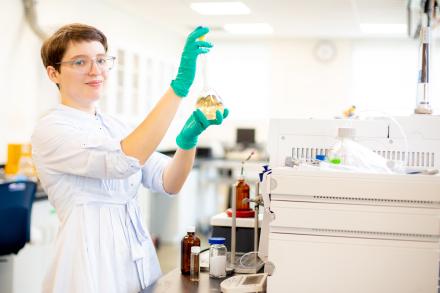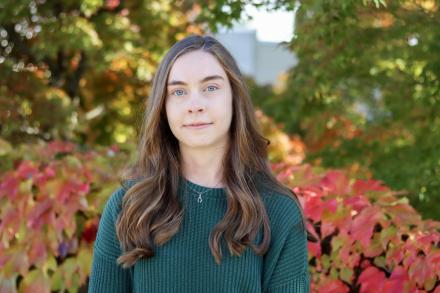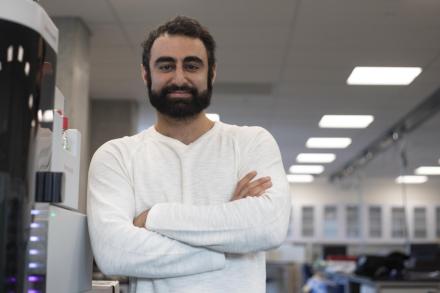Savannah Mercer shares her undergraduate research
Doing research as an undergraduate student has helped Savannah Mercer make the connection between what she is learning in class and how it can be applied in the real world.
The fourth-year Bachelor of Science student is part of Dr. Heather Wiebe’s Molecular Modelling Research Group, which specializes in computational chemistry. The group uses computer simulations to answer scientific questions.
Savannah, whose hometown is Parksville, decided to attend VIU because it was close to home and offered small class sizes.
“The small class sizes have allowed me to make meaningful connections with my faculty and with other students, which has played a large role in my academic development,” says Savannah.
We caught up with Savannah to find out more about her research and some highlights from her time at VIU.
Can you share a highlight of your time here so far?
Being part of undergraduate research has been a major highlight of my time at VIU. It has allowed me to become more involved during my studies and it is helpful to see what you learn in class being applied to solve real-world problems. It adds context to your courses, and it’s fascinating to observe that connection. I also had the opportunity to attend a conference last summer in Kelowna where I gave a poster presentation. Overall, it was a lot of fun and a great experience.
Describe your research.
I have been involved in two research projects with Heather, both centered around computational chemistry. The first project involves studying the mechanisms that grant pressure resistance in proteins of deep-sea organisms, and how these pressure-resistant adaptations affect the ability of organisms to metabolize contaminants due to plastic pollution. The second project is in collaboration with Dr. Chris Gill and the harm reduction drug checking work done in Victoria, BC. I’m investigating the toxicity of opioid-like molecules found in street drugs.
What have you found out so far?
The first project is still in its early stages, and we are trying to understand the underlying chemistry of deep-sea proteins. This work will help in designing synthetic pressure-resistant proteins, which have applications in the food and pharmaceutical industries. It will also allow us to understand the future implications of human activity in the ocean, and if there are certain types of pollutants that we really need to worry about.
For the second project, we have performed a preliminary study which suggests that these opioid-like molecules found in street drugs may be biologically active, and this work has recently been published in a journal article. This project is ongoing and a more in-depth study will be performed to obtain more accurate, biologically relevant data to determine the role of the activity of these molecules.
What do you like best about undergraduate research?
I enjoy having the opportunity to learn something new every day, while also challenging myself. I enjoy the hands-on learning aspect of research and applying knowledge to answer scientific questions. I’ve learned so much from participating in research and it’s given me the opportunity to expand on skills such as problem solving, time management and communication, which have all helped with my courses and can be applied to other aspects of my life. Research can be extremely rewarding, knowing that the scientific community and beyond could benefit from it.
What advice do you have for new students, or those thinking of doing research?
Stay curious during your studies and open yourself up to new ideas. Having an open mind allows you to figure out what your interests are, and it is important that you enjoy what you do. You never know what you will discover along the way and the type of opportunities and experiences you will encounter. For those thinking of doing research, I recommend getting to know your professors and reaching out to them for research opportunities. Getting involved in any way and being active in your studies is a great opportunity to meet people who share similar interests as you and it allows you to explore what you like doing while gaining many valuable skills.
What VIU resource do you wish you knew about sooner?
Overall, VIU is an extremely supportive campus and one that makes you feel like you are part of a community. There are many resources available to students. The faculty in the Chemistry department have continuously supported me throughout my education. My professors have consistently provided encouragement, and they are very committed to their students, helping them to succeed in any way.
What’s next for you after VIU?
After I graduate from VIU, my plan is to continue my research and attend graduate school for chemistry. I look forward to pursuing what I am passionate about and I am very excited to see where this journey will take me.

"I enjoy having the opportunity to learn something new every day, while also challenging myself. I enjoy the hands-on learning aspect of research and applying knowledge to answer scientific questions. I’ve learned so much from participating in research and it’s given me the opportunity to expand on skills such as problem solving, time management and communication, which have all helped with my courses and can be applied to other aspects of my life. Research can be extremely rewarding, knowing that the scientific community and beyond could benefit from it."
Related Posts
Got an article idea for the blog? Email students@viu.ca.



